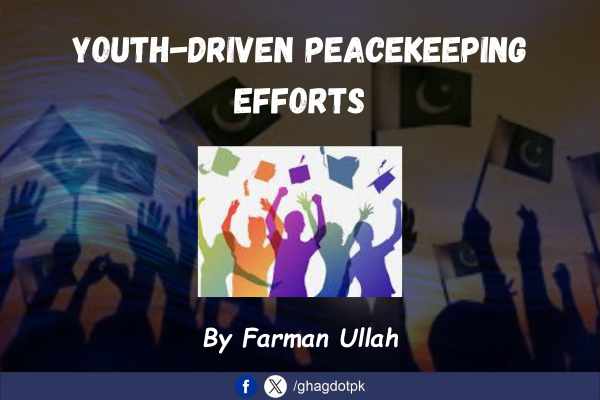By Farman Ullah
The role of youth in nation-building is crucial, as young people bring fresh perspectives, energy, and innovation to society. They have the potential to drive progress in various sectors, including education, technology, social justice, and the economy. By actively participating in community service, promoting social cohesion, and engaging in entrepreneurship, youth can address pressing challenges and shape a prosperous future. With their adaptability and openness to change, they play a pivotal role in fostering peace, unity, and development, making them essential contributors to a nation’s growth and resilience. Empowering and investing in the youth is, therefore, an investment in the country’s future.
Youth Demographics and the Security Landscape
According to UNDP, KP and Balochistan are known for their young populations, with youth under 30 comprising over 60% of the population. This demographic is both a critical asset and a potential vulnerability, especially given high unemployment rates and limited opportunities for advancement.
Youth Vulnerability to Extremism and Radicalisation
Due to high unemployment and limited educational access, youth in these areas face elevated risks of radicalization. A Pak Institute for Peace Studies (PIPS) 2022 report suggests that the combination of poverty, lack of education, and weak state presence in certain areas makes youth susceptible to extremist recruitment. According to the Pakistan Bureau of Statistics, KP and Balochistan have youth unemployment rates above 10%. The low educational attainment levels, with around 40% of young people not completing secondary school, further compound security concerns.
Youth Engagement in Peacebuilding
Youth in KP’s Swat region and Balochistan’s Turbat area have engaged in community-led peace initiatives, aiming to reduce crime and violence. Programs led by the National Counter Terrorism Authority (NACTA) and UNDP support these efforts with community dialogue forums, promoting local peace.
According to UNDP’s Youth and Peacebuilding Program, areas with active youth engagement in peacebuilding report lower crime rates and improved community relations.
Social Media and Digital Advocacy for Peace
Youth in KP and Balochistan increasingly use social media platforms to counter misinformation, spread messages of peace, and support community resilience. Pakistan Telecommunication Authority (PTA) data indicates that 70% of Pakistani youth access the internet, and many use social media to support positive narratives.
Success in Digital Peacebuilding
Digital campaigns have been instrumental in fostering youth involvement in local security discussions. For instance, the YouthforPeace campaign in 2023 saw high engagement from KP youth.
Recommendations
Creating safe and inclusive community centers can offer youth a supportive environment where they can engage in constructive activities, learn new skills, and connect with mentors. Expanding sports and arts programs can also foster teamwork, discipline, and creativity, providing healthy outlets for energy and expression. Encouraging youth-led initiatives and providing grants for community-based projects can give young people a sense of ownership in improving their regions. Additionally, promoting civic education on peacebuilding, conflict resolution, and leadership can prepare youth to play positive roles in society. Establishing mental health support services is also essential to address the psychological impact of security issues on youth. Lastly, creating internship and apprenticeship opportunities in both the public and private sectors will help bridge the gap between education and employment, making youth valuable contributors to the regional and national economy. These combined efforts can channel youth potential toward building a stable, prosperous future for KP and Balochistan.






